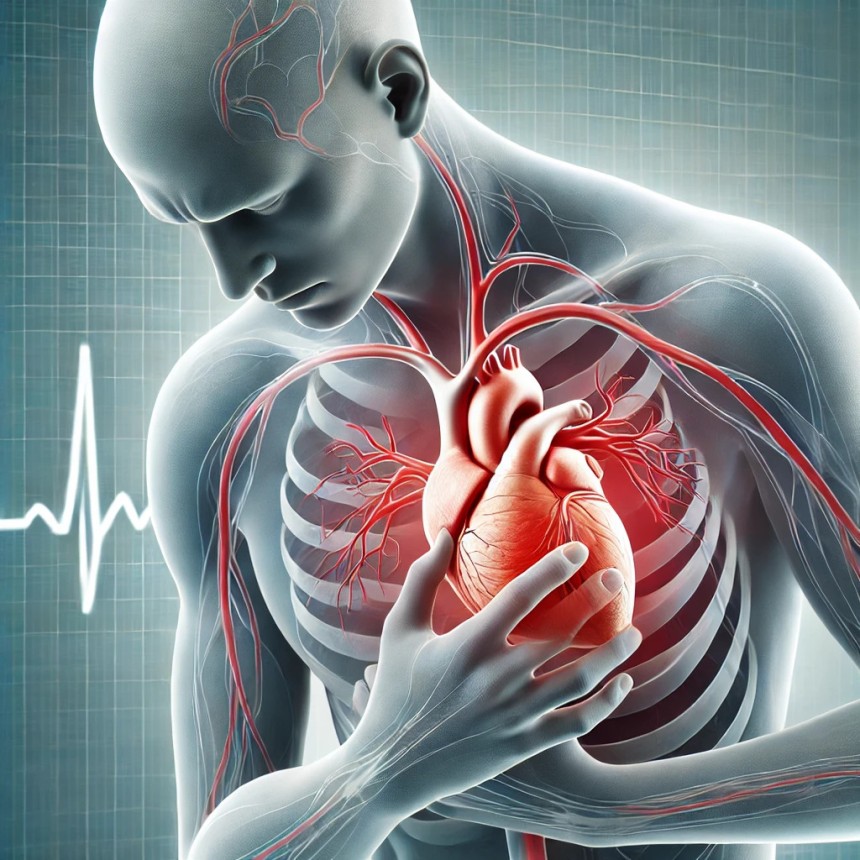
Overview of Heart Disease : Symptoms,Causes,Prevention,Treatment
Heart disease is a broad term encompassing various conditions affecting the heart and blood vessels. It remains a leading cause of death worldwide, but many cases can be prevented through lifestyle changes and medical intervention.
1. Causes of Heart Disease

Heart disease can be caused by several factors, often linked to lifestyle, genetics, or medical conditions:
- Atherosclerosis (buildup of plaque in arteries)
- High blood pressure (hypertension)
- High cholesterol
- Diabetes
- Obesity
- Smoking
- Excessive alcohol consumption
- Sedentary lifestyle
- Poor diet (high in saturated fats, sugar, and processed foods)
- Genetic predisposition
2. Symptoms of Heart Disease

Symptoms vary depending on the specific type of heart disease. Common warning signs include:
- Chest pain (angina) – pressure, tightness, or discomfort in the chest
- Shortness of breath
- Fatigue
- Dizziness or fainting
- Heart palpitations
- Swelling in the legs, ankles, or feet (edema)
- Pain in the jaw, neck, back, or arms
3. Types of Heart Disease

- Coronary Artery Disease (CAD): Narrowed or blocked arteries leading to reduced blood flow.
- Heart Attack (Myocardial Infarction): Occurs when blood flow to part of the heart is completely blocked.
- Arrhythmia: Irregular heartbeats (too fast, too slow, or erratic).
- Heart Failure: When the heart can't pump blood efficiently.
- Valvular Heart Disease: Damage or malfunction of the heart valves.
- Congenital Heart Defects: Structural issues present at birth.
4. Prevention of Heart Disease

Many cases of heart disease can be prevented by adopting a heart-healthy lifestyle:
- Maintain a balanced diet: Eat more fruits, vegetables, whole grains, lean proteins, and healthy fats.
- Exercise regularly: Aim for at least 150 minutes of moderate activity per week.
- Avoid smoking and limit alcohol intake.
- Manage stress: Practice mindfulness, yoga, or meditation.
- Control blood pressure, cholesterol, and diabetes through medication and lifestyle adjustments.
- Maintain a healthy weight.
5. Medications for Heart Disease

Doctors may prescribe medications to manage heart disease, including:
- Statins – Reduce cholesterol levels.
- Beta-blockers – Lower blood pressure and heart rate.
- ACE inhibitors – Help relax blood vessels.
- Anticoagulants – Prevent blood clots.
- Diuretics – Help remove excess fluid from the body.
6. Surgical and Medical Interventions

For advanced cases, surgery or medical procedures may be necessary:
- Angioplasty and Stents: Open blocked arteries.
- Bypass Surgery: Reroute blood flow around blocked arteries.
- Pacemakers and Defibrillators: Regulate irregular heart rhythms.
- Heart Transplant: For severe heart failure cases.
7. Living with Heart Disease

If diagnosed with heart disease, managing it effectively is crucial:
- Regular doctor visits and monitoring.
- Taking medications as prescribed.
- Following a heart-healthy diet and exercise plan.
- Joining support groups or cardiac rehabilitation programs.
Heart disease is a serious but often preventable condition. By making lifestyle changes, following medical advice, and seeking timely treatment, individuals can reduce their risk and lead healthier lives.





